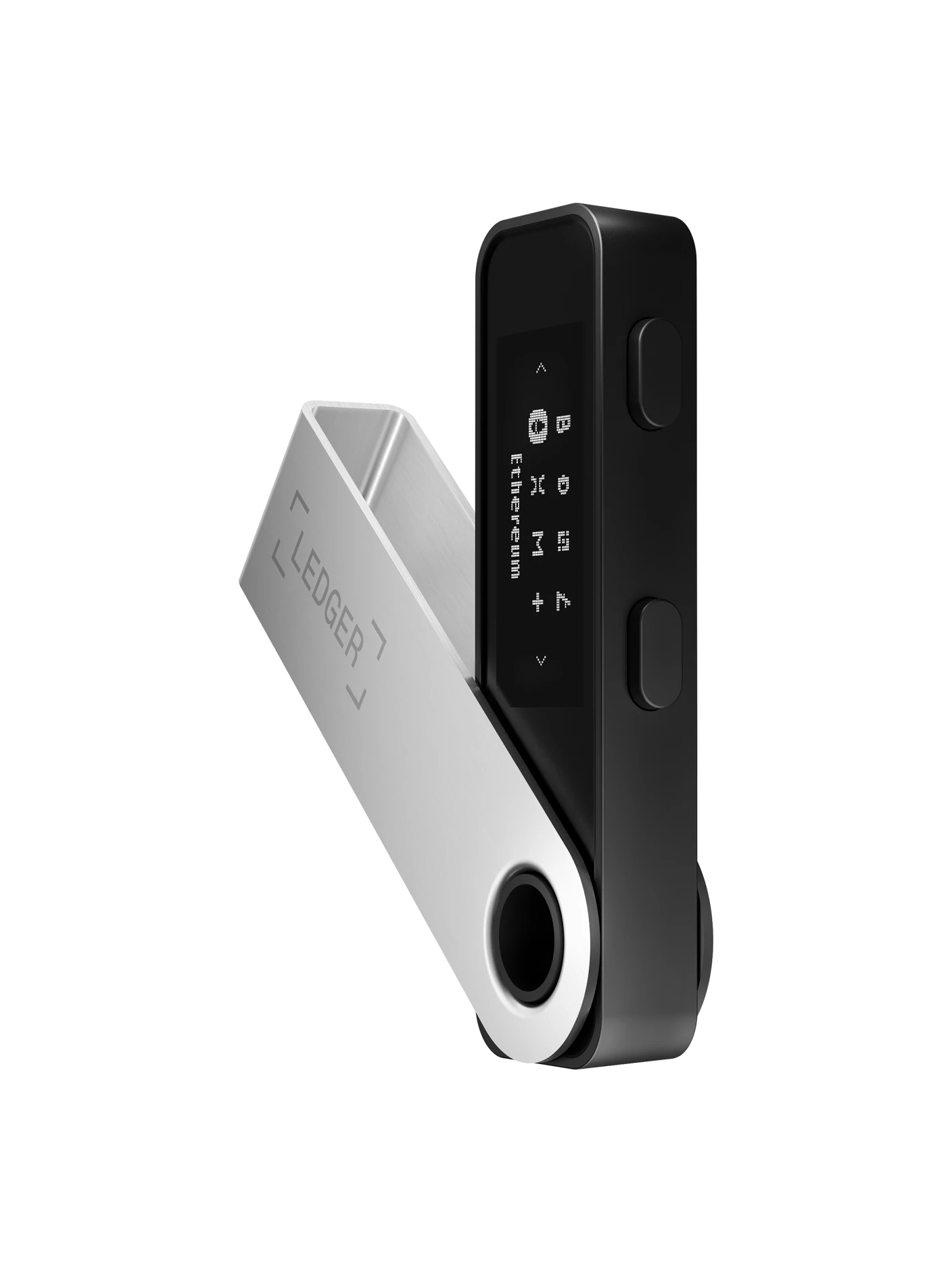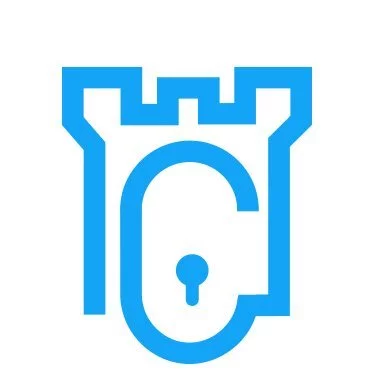Seed phrase or recovery phrase is a list of words that act as the key to your wallet. In case of a break of your computer, your wallet’s seed phrase is the only way to restore it. With that in mind, you should keep your seed phrase guarded and out of danger; that’s where hardware wallets come into play. Based on our review of the market, this is a list of the best hardware wallets available:
Disclosure! This List contains links that may earn us a small commission at no extra cost to you. Our website’s metrics and compensation determine the order of the List. Please don’t consider it as ranking and evaluate items individually.100% Air-gapped Hardware Wallet
Unlike many other hardware wallets that have USB ports and Bluetooth, Keystone is in complete isolation. Private keys are stored on cold storage, and for making a transaction, you need to scan the QR code displayed on Keystone’s screen.
Swiss Made Hardware Wallet
The BitBox02 features a dual-chip design with a secure chip. The source code has been independently audited by security researchers and is fully open-source.
Air-gapped Crypto Hardware Wallet
Ellipal is a hardware wallet that’s in complete isolation from the world. You only need an Ellipal device and a mobile app to access your wallet.
The First Crypto Hardware Wallet
Ledger Nano S Plus is a new device made by Ledger that aims at securing your crypto assets and providing more features than the previous version.
Crypto Wallet for Bitcoin, Ethereum and more
SafePal securely stores your crypto assets in the most simple and easy way. Truly mobile-friendly, supporting major cryptocurrencies like Bitcoin, BNB, Ethereum, and more.
Secure crypto hardware wallet | eSignus
Comfortable like a soft wallet and secure like a cold wallet is the most precise definition of a HASHWallet Link card. It’s the little sister of the HASHWallet smartcards family but fully maintains all its safety features and easiness. With this firs
Secure Hardware Wallet for Bitcoin, ETH, USDT and all crypto
Founded in Malaysia in 2019 by a highly experienced group of IT professionals who combined the latest hardware and software technologies to build the most secure and simple hardware wallet for cryptocurrencies.
Crypto Hardware Wallet
The GridPlus Lattice1 and SafeCards use uncompromising security to enable the most secure cryptocurrency storage ever created.
Secure Cryptocurrency Hardware Wallet
Trezor is the world’s first and most secure cryptocurrency hardware wallet. Your information is kept safe and never stored on servers.
Own Your Crypto In Style
CoolWallet is one of the most secure crypto hardware wallets for Bitcoin, Ethereum, Litecoin, Bitcoin Cash, and ERC20 Token.
Hardware Wallets Guide
Guide to Crypto Hardware Wallets
Welcome to our guide on Crypto Hardware Wallets. As the world of cryptocurrency continues to expand, it’s becoming increasingly important to ensure the security of your digital assets. This is where Crypto Hardware Wallets come in. In this guide, we will provide you with a comprehensive overview of what Crypto Hardware Wallets are, their benefits, and how they work. We will also explore different types of Crypto Hardware Wallets and provide you with guidance on selecting the best hardware wallet for your needs.
Key Takeaways
- Crypto Hardware Wallets are designed to securely store and manage your cryptocurrency assets.
- They differ from other types of wallets, such as software wallets or exchange wallets, in that they are physical devices that store your private keys offline.
- There are different types of Crypto Hardware Wallets available with varying features and functionalities.
- When selecting a Crypto Hardware Wallet, it’s important to consider factors such as security features, compatibility with different cryptocurrencies, and user-friendliness.
- Crypto Hardware Wallets offer enhanced security and protection against hacking and malware attacks but also come with potential risks and limitations.
What are Crypto Hardware Wallets?
Crypto Hardware Wallets are physical devices used to store and manage private keys for cryptocurrency transactions. Unlike software wallets that store private keys online or exchange wallets that store private keys on a centralized server, Crypto Hardware Wallets keep private keys offline. This offline storage ensures that the private keys are not vulnerable to hacking or malware attacks.
What is a Private Key?
A private key is a secret code that grants access to a specific cryptocurrency wallet. Without the private key, it is impossible to transfer or use the cryptocurrency stored inside the wallet. Therefore, it is essential to keep private keys secure.
How do Crypto Hardware Wallets Store Private Keys?
Crypto Hardware Wallets store private keys in a secure cryptographic chip. The chip is tamper-resistant, making it nearly impossible to extract private keys from the device. Moreover, most Crypto Hardware Wallets require a PIN code or biometric authentication to access the private keys, adding an extra layer of security.
How do Crypto Hardware Wallets Differ from other Wallets?
Software wallets and exchange wallets store private keys online, making them vulnerable to hacking or malware attacks. Crypto Hardware Wallets, on the other hand, store private keys offline, making them immune to such attacks. Moreover, Crypto Hardware Wallets are more user-friendly and provide a more secure, convenient, and reliable way to manage cryptocurrency assets.
Types of Crypto Hardware Wallets
Crypto Hardware Wallets are essential devices for securing cryptocurrency assets. They are physical devices that store private keys and facilitate transactions, making them a safer alternative to software or exchange wallets. There are different types of Crypto Hardware Wallets available in the market, and each has its features and functionality.
Trezor Hardware Wallets
Trezor is one of the first and most popular Crypto Hardware Wallet manufacturers in the industry. The Trezor wallet is designed with high-security standards and provides support for multiple cryptocurrencies. It comes with a micro USB port, a small screen, and two buttons that enable users to interact with the device. Trezor wallet is also easy to use and is suitable for both beginners and advanced users.
KeepKey Hardware Wallets
KeepKey is another well-known Crypto Hardware Wallet manufacturer that provides secure storage for cryptocurrencies. The KeepKey wallet has a sleek design with a large OLED screen for easy navigation and confirmation of transactions. It supports a wide range of cryptocurrencies, including Bitcoin, Ethereum, and Litecoin. KeepKey hardware wallets are also backed up by BIP39, making them a reliable storage option for crypto assets.
Ledger Hardware Wallets
| Device Name | Key Features | Supported Cryptocurrencies |
|---|---|---|
| Ledger Nano S | – Secure chip technology – Multi-currency support – Built-in OLED display – Backup and restoration process |
– Bitcoin (BTC) – Ethereum (ETH) – Ripple (XRP) – Litecoin (LTC) – Bitcoin Cash (BCH) and more |
| Ledger Nano X | – Bluetooth connectivity – Multi-currency support – Mobile compatibility – Larger storage capacity |
– Same as Ledger Nano S and more |
Ledger is a reputable brand known for its high-quality Crypto Hardware Wallets. They offer several devices, including Ledger Nano S and Ledger Nano X, which provide secure storage for different cryptocurrencies. These wallets are designed to be portable, with features such as Bluetooth connectivity, multi-currency support, and compatibility with mobile devices. Ledger wallets use a secure chip technology that prevents unauthorized access or hacking attempts.
BitBox Hardware Wallets
BitBox is a unique Crypto Hardware Wallet that offers minimalist design and robust security features. It is a Bitcoin-only wallet with multi-signature support, making it a suitable option for businesses and individuals that require the highest levels of security. BitBox wallets also come with a mobile app that enables users to access their accounts and complete transactions from anywhere.
When choosing a Crypto Hardware Wallet, it is essential to consider factors such as security, ease of use, and supported cryptocurrencies. Users should also compare prices and features to select the most suitable device for their needs. With the variety of options available, there is a Crypto Hardware Wallet to suit every preference.
How do Crypto Hardware Wallets work?
Crypto Hardware Wallets work by securely storing the private keys used to access and authenticate cryptocurrency transactions. These wallets operate using advanced security measures, keeping the private keys offline and away from potential hackers, virus infections, or malware.
Key Components of Crypto Hardware Wallets
The main components of Crypto Hardware Wallets are as follows:
| Component | Description |
|---|---|
| Private Key Storage | The mechanism for storing private keys, usually by generating them offline and never exposing them to the internet or unsecured networks. |
| Encryption | The process of encoding data to prevent unauthorized access or hacking attempts while in storage or transfer. |
| Transaction Signing | The process of authorizing and signing cryptocurrency transactions using the private keys stored in the hardware wallet. |
Crypto Hardware Wallets derive their security from the fact that private keys never leave the device and transactions require physical interaction with the wallet. When a transaction is initiated, it is signed by the wallet offline, and the signed transaction is then broadcast to the network through a connected device.
Security Features of Crypto Hardware Wallets
Some of the key security features of Crypto Hardware Wallets include:
- Passphrase Protection: Hardware wallets can be secured with a passphrase, making it difficult for unauthorized access in case of theft or loss.
- Two-Factor Authentication: Some hardware wallets support two-factor authentication (2FA) to add an additional layer of security.
- Multi-Currency Support: Hardware wallets can support multiple cryptocurrencies, offering users the option to manage various assets within one device.
- Offline Storage: Hardware wallets do not require an internet connection, ensuring protection against phishing attacks and hacking attempts.
Transaction Process in Crypto Hardware Wallets
The transaction process in Crypto Hardware Wallets involves the following steps:
- Connect your hardware wallet to a computer or compatible mobile device.
- Enter your wallet passphrase to access the device.
- Authorize the transaction using the device’s buttons or touch screen.
- Confirm the transaction details and sign the transaction with the wallet’s private key.
- Broadcast the signed transaction to the network using your connected device.
The private keys stored in the Crypto Hardware Wallets never leave the device, and transactions are signed offline for added security.
Crypto Hardware Wallets offer an excellent option for keeping cryptocurrency safe from potential cyber threats and are becoming increasingly popular among crypto investors. The following section provides guidance on how to select the best Crypto Hardware Wallet that fits individual needs.
Selecting the Best Crypto Hardware Wallet
Choosing the right Crypto Hardware Wallet is crucial for safeguarding your cryptocurrency investments. Here are some factors to consider when selecting the best hardware wallet:
- Security Features: Look for a wallet that offers robust security features, such as two-factor authentication, PIN codes, and biometric authentication.
- User-Friendliness: Consider how easy the wallet is to set up and use. Look for features like intuitive interfaces, clear instructions, and user-friendly mobile apps.
- Compatibility: Check that the hardware wallet supports the cryptocurrencies you plan to store and trade.
- Customer Support: Ensure that the wallet comes with reliable and responsive customer support, including FAQs, forums, and contact details.
- Price: Consider the price of the wallet, but don’t prioritize cost over security and functionality. A good hardware wallet is a long-term investment in your cryptocurrency security.
Top Picks for the Best Crypto Hardware Wallets
Based on our review of the market, these are some of the best hardware wallets available:
| Wallet Name | Price | Supported Cryptocurrencies | Security Features | User-Friendliness | Customer Support |
|---|---|---|---|---|---|
| Ledger Nano X | $119 | 1,800+ | 2FA, PIN, biometric authentication, secure element chip | User-friendly mobile app, easy set-up | Live chat, email support, extensive FAQs |
| Trezor Model T | $179 | 1,600+ | 2FA, passphrase protection, PIN, password manager | Large touch screen, intuitive user interface | Email support, extensive knowledge base |
| SafePal S1 | $39.99 | 10+ | 100% offline, EAL5+ secure chip, anti-tamper packaging | User-friendly mobile app, wallet recovery through other devices | 24/7 online support, knowledge base, community forum |
These are just a few of the many hardware wallets available on the market. Choose the one that best fits your needs and budget, and enjoy the peace of mind that comes with knowing your cryptocurrency is safe and secure.
Wallets for Bitcoins
Bitcoin is the world’s first and most popular cryptocurrency, so it’s no surprise that there are several Crypto Hardware Wallets designed specifically for storing and managing Bitcoins. Let’s explore some of the best options available on the market.
| Name | Supported Cryptocurrencies | Price (USD) | Features |
|---|---|---|---|
| Trezor Model T | Bitcoin, Bitcoin Cash, Bitcoin Gold, Litecoin, Ethereum, Ethereum Classic, DASH, Zcash, NEM, ERC-20 Tokens | 169 | Touchscreen Display, Easy-to-Use Interface, Supports Passphrases and 2-Factor Authentication, Supports Multiple Accounts |
| Ledger Nano S | Bitcoin, Bitcoin Cash, Bitcoin Gold, Litecoin, Ethereum, Ethereum Classic, DASH, Zcash, Ripple, Stratis, Komodo, Ark, PoSW, ERC-20 Tokens | 59 | Compact Design, 2-Factor Authentication, Supports Multiple Accounts, Compatible with Multiple Wallets |
| KeepKey | Bitcoin, Bitcoin Cash, Bitcoin Gold, Litecoin, Ethereum, DASH, Dogecoin, Namecoin, Testnet | 49 | Larger Display, Easy-to-Use Interface, Backup and Recovery Options, Supports Multiple Accounts |
These Crypto Hardware Wallets offer different features and levels of security, but all are designed to keep your Bitcoin assets safe and secure. Consider your individual needs and preferences when selecting the best wallet for you.
Ledger Stax: A Comprehensive Review
In this section, we will provide an in-depth review of Ledger Stax, a popular Crypto Hardware Wallet in the market.
Introduction
Ledger Stax is a cryptocurrency hardware wallet developed by Ledger, a reputable company known for its range of high-quality crypto wallets. This sleek and compact device is designed to provide users with the ultimate security and control over their digital assets.
Features
Ledger Stax is packed with features that make it stand out from other hardware wallets. One of its most notable features is the triple-layered security architecture that includes a secure element, custom OS, and a proprietary security chip. This provides users with an unparalleled level of protection against hacking and other malicious attacks.
Another key feature of the Ledger Stax is its compatibility with over 1,800 cryptocurrencies, making it one of the most versatile wallets on the market. Users can easily manage their portfolio of coins and tokens through the simple and intuitive Ledger Live app, which can be downloaded onto their desktop or smartphone.
Security
As mentioned, Ledger Stax employs a triple-layered security architecture that provides an extremely high level of protection against hacking and other malicious attacks. The secure element, custom OS, and proprietary security chip work together to ensure that users’ private keys are kept safe and secure at all times.
In addition, users can set up a recovery phrase during the initial setup process, which can be used to restore their wallet in case it is lost or damaged. This recovery phrase is also protected by the device’s security architecture, ensuring that it is kept safe and secure.
Compatibility
Ledger Stax is compatible with a wide range of operating systems, including Windows, Mac, Linux, Android, and iOS. This makes it easy for users to manage their digital assets on whatever device they prefer.
Furthermore, Ledger Stax is compatible with a wide range of wallets and exchanges, making it easy for users to transfer funds and manage their portfolio. The Ledger Live app also provides users with real-time market data, making it easier to make informed investment decisions.
User Experience
The Ledger Stax is designed with the user in mind, and its sleek and intuitive design makes it easy for users to manage their digital assets. The Ledger Live app is user-friendly and provides users with all the information they need to manage their portfolio effectively.
In addition, Ledger offers excellent customer support to assist users with any issues they may encounter. This includes email support, a comprehensive knowledge base, and a community forum where users can connect with each other and share their experiences.
| Pros | Cons |
|---|---|
| Triple-layered security architecture | Relatively expensive compared to other hardware wallets |
| Compatible with over 1,800 cryptocurrencies | Requires a USB-C cable for connectivity |
| Sleek and intuitive design | No Bluetooth connectivity |
| Easy to set up and use | Not as portable as some other hardware wallets |
Conclusion
Ledger Stax is an excellent choice for anyone looking for a high-quality and secure hardware wallet. Its triple-layered security architecture, wide range of compatibility, and user-friendly design make it a top choice for managing a cryptocurrency portfolio.
Safepal S1: A Reliable Hardware Wallet
When it comes to selecting a reliable Crypto Hardware Wallet, SafePal S1 is a popular choice among users. This hard wallet crypto offers a range of features that make it stand out from other wallets in the market. In this section, we will explore its unique features and user-friendliness that make it a preferred choice for crypto investors.
SafePal Wallet Overview
SafePal is a cryptocurrency hardware wallet that uses advanced security measures to keep your digital assets safe. Its offline, air-gapped, and secure chips prevent any unauthorized access, ensuring the safety of your coins even in case of malware attacks or security breaches.
SafePal S1 is a compact, easy-to-use device that allows users to manage their cryptocurrencies seamlessly. This hard crypto wallet supports over 10,000 cryptocurrencies and ERC-20 tokens, making it an ideal choice for investors with diverse portfolios.
Features and Benefits
SafePal S1 offers a range of features that make it a reliable and user-friendly hardware wallet. Some of its notable features include:
| Feature | Benefits |
|---|---|
| Large Touch Screen | Easy-to-use interface with enhanced visual experience |
| 100% Offline | Secure chips enable offline storage for added protection |
| Multiple Cryptocurrency Support | Support for over 10,000 cryptocurrencies and ERC-20 tokens |
| Built-in Exchange | Instantly exchange cryptocurrencies within the wallet without the need to transfer funds to an external exchange |
| Mobile App Integration | Manage the wallet through the SafePal App on your smartphone |
Setting Up and Using SafePal S1
Setting up SafePal S1 is a straightforward process that involves downloading the SafePal App to your smartphone, connecting the device, and following the on-screen instructions. Once set up, you can manage your cryptocurrencies using the intuitive touch screen interface or the SafePal App on your smartphone. The device also comes with a recovery phrase that you can use to restore your wallet in case it gets lost or damaged.
Customer Reviews
Users have praised SafePal S1 for its user-friendliness and security features. One user notes, “SafePal S1 is easy to use, and the touch screen makes it easy to navigate. The device is highly secure, and I feel confident storing all my cryptocurrencies in it.”
Another user states, “I love the fact that SafePal S1 supports multiple cryptocurrencies, and the built-in exchange feature makes it easy to trade within the wallet. The mobile app integration is also a plus, as I can manage everything from my smartphone.”
Conclusion
SafePal S1 is a reliable hardware wallet that offers a range of features to keep your cryptocurrencies safe and secure. Its user-friendly interface, offline storage, and multiple cryptocurrency support make it an ideal choice for both novice and experienced investors in the crypto space. Consider the SafePal S1 when selecting your next hard wallet for crypto storage needs.
Exploring the Ledger Hardware Wallets
Ledger is a well-known and highly-regarded brand in the Crypto Hardware Wallet market, offering a range of devices with different features and capabilities. Let’s take a closer look at the Ledger hardware wallets, including the Ledger Nano S, Ledger Nano X, and Ledger Blue.
Ledger Nano S
The Ledger Nano S is a compact and affordable hardware wallet that offers basic functionality for securely storing and managing a variety of cryptocurrencies. It has a small monochrome screen, two buttons for navigation, and a sleek design that fits easily in a pocket or on a keychain. The Ledger Nano S supports over 1,500 cryptocurrencies, including Bitcoin, Ethereum, and Litecoin. It also includes a security feature called a “secure element,” which ensures that private keys are stored safely and protected from external threats.
| Pros | Cons |
|---|---|
| Compact and portable design | Small screen can be difficult to read |
| Supports over 1,500 cryptocurrencies | Basic functionality compared to other Ledger devices |
| Affordable price point |
Ledger Nano X
The Ledger Nano X is a more advanced hardware wallet than the Ledger Nano S, offering additional features and functionality. It has a larger color screen, Bluetooth connectivity, and an increased storage capacity. The Ledger Nano X can hold up to 100 different cryptocurrency accounts simultaneously and supports all the same cryptocurrencies as the Nano S. Additionally, the Ledger Nano X has a battery that can last up to eight hours on a single charge, making it more convenient for users who need to access their wallets on the go.
| Pros | Cons |
|---|---|
| Larger, color screen | Higher price point than Ledger Nano S |
| Bluetooth connectivity | Battery life may be an issue for some users |
| Increased storage capacity |
Ledger Blue
The Ledger Blue is the most advanced and feature-rich hardware wallet offered by Ledger. It has a large touchscreen display, a built-in rechargeable battery, and even includes a camera for QR code scanning. The Ledger Blue supports over 1,500 cryptocurrencies and has a unique security feature called “dynamic transaction fees,” which ensures that users are always paying the lowest possible fee for their transactions. The Ledger Blue also includes a number of advanced security features, such as a “PIN matrix” that scrambles every time the device is used to prevent hackers from detecting the PIN code.
| Pros | Cons |
|---|---|
| Largest, full-color touchscreen display | Highest price point among Ledger devices |
| Built-in rechargeable battery | Larger size may not be as portable as other Ledger devices |
| Advanced security features |
Overall, Ledger hardware wallets are some of the most reliable and secure options available for storing and managing cryptocurrencies. Whether you’re a beginner or an advanced user, there is a Ledger device that will fit your needs and budget.
Advantages of Crypto Hardware Wallets
Crypto Hardware Wallets offer multiple advantages over other types of wallets, making them an excellent choice for securing your cryptocurrency assets. Here are some of the key benefits:
- Enhanced Security: Crypto Hardware Wallets provide offline storage, making them less susceptible to hacking and malware attacks. They also come with features like PIN protection, two-factor authentication, and multi-signature support, further ensuring the security of your crypto assets.
- Easy Backup and Recovery: Crypto Hardware Wallets come with seed phrases that allow easy backup and recovery of your wallet. This feature makes it easy to restore access to your funds in case of loss or damage to the hardware wallet.
- Support for Multiple Cryptocurrencies: Most Crypto Hardware Wallets support multiple cryptocurrencies, allowing you to store and manage all your assets in one place.
- User-Friendly: Crypto Hardware Wallets are designed to be user-friendly, with intuitive interfaces and simple setup processes. They are also backed by extensive online resources, including tutorials and FAQs, to help users navigate any technical issues.
- Peace of Mind: Crypto Hardware Wallets offer peace of mind knowing that your assets are stored securely, and you have complete control over your private keys. This control eliminates the need for intermediaries, reducing the risk of theft or loss.
Risks and Limitations of Crypto Hardware Wallets
Crypto Hardware Wallets are considered one of the most secure ways to store cryptocurrency due to their offline storage and encryption features. However, like any technology, they have their risks and limitations.
Physical Damage
Unlike software wallets, Crypto Hardware Wallets are susceptible to physical damage. If the device is dropped or exposed to extreme temperatures or moisture, the wallet’s circuitry can be damaged, rendering the wallet unusable. To prevent this, it is essential to store the wallet in a cool, dry place and handle it with care.
Loss or Misplacement
Another risk associated with Crypto Hardware Wallets is loss or misplacement. They are small and portable, making them easy to lose or misplace. If a Crypto Hardware Wallet is lost, it is essential to have a backup recovery phrase to restore access to the wallet’s funds. It is recommended to store the recovery phrase in a secure location separate from the wallet itself.
User Responsibility
With Crypto Hardware Wallets, the user bears full responsibility for managing their private keys. If the private key is lost or stolen, the funds in the wallet cannot be recovered. It is crucial to keep the private key secure and not disclose it to anyone. Additionally, if the user forgets their PIN or passwords, they may lose access to their funds permanently.
Limited Compatibility
Crypto Hardware Wallets have limited compatibility with cryptocurrencies. While most hardware wallets support popular cryptocurrencies like Bitcoin and Ethereum, they may not support every crypto asset. It is essential to research which cryptocurrencies are supported by a specific hardware wallet before making a purchase.
Conclusion
Crypto Hardware Wallets are generally considered the safest way to store cryptocurrency due to their security features. However, they do have their risks and limitations, including susceptibility to physical damage, loss, user responsibility, and limited compatibility. It is crucial for users to understand these risks and take necessary precautions to protect their assets.
Setting Up and Using a Crypto Hardware Wallet
Setting up a Crypto Hardware Wallet is an essential step in securing your cryptocurrency assets. Here is a step-by-step guide on how to initialize and use your device:
Step 1: Unboxing and Connecting the Device
When you unbox your Crypto Hardware Wallet, you will find a device, a USB cable, and instructions on how to get started. The first thing you should do is connect your device to a computer or mobile device using the USB cable.
Step 2: Initializing the Device
After connecting the device, you will be prompted to initialize it. Follow the on-screen instructions to set up a PIN code, write down your recovery phrase (a series of random words), and confirm your settings. Ensure you store your recovery phrase safely, preferably offline and in a secure location.
Step 3: Installing the Wallet Software
Once you have initialized your device, you need to install the wallet software that is compatible with your Crypto Hardware Wallet. The manufacturer will provide you with instructions on how to download and install the software. Ensure that you only download software from a trusted source.
Step 4: Adding Cryptocurrencies to Your Wallet
After installing the wallet software, go to the section for adding new cryptocurrencies and select the ones you want to manage on your device. Follow the on-screen instructions to add each cryptocurrency to your wallet.
Step 5: Sending and Receiving Cryptocurrencies
To send or receive cryptocurrencies, ensure that your Crypto Hardware Wallet is connected to your computer or mobile device, launch the wallet software and follow the instructions on-screen to complete the transaction. Verify the transaction details and confirm the transaction on the device to complete it.
Remember, always double-check the wallet address before initiating transactions to prevent errors or fraud attempts.
Tips for Safely Storing a Crypto Hardware Wallet
Properly storing a Crypto Hardware Wallet is critical to ensuring the security of your cryptocurrency assets. Here are some tips to follow:
- Store your hardware wallet in a secure location, such as a safe or vault.
- Avoid storing the hardware wallet in a location that is easily accessible to others.
- Back up your recovery phrase on a piece of paper and store it separately from the hardware wallet.
- Consider using a fireproof and waterproof storage device to store the recovery phrase.
- Do not store the recovery phrase on any digital devices, such as smartphones or computers, to avoid potential hacking or malware attacks.
- Consider using a multi-signature wallet to increase security by requiring multiple parties to approve a transaction.
By following these tips, you can ensure that your Crypto Hardware Wallet remains secure and protected from potential threats.
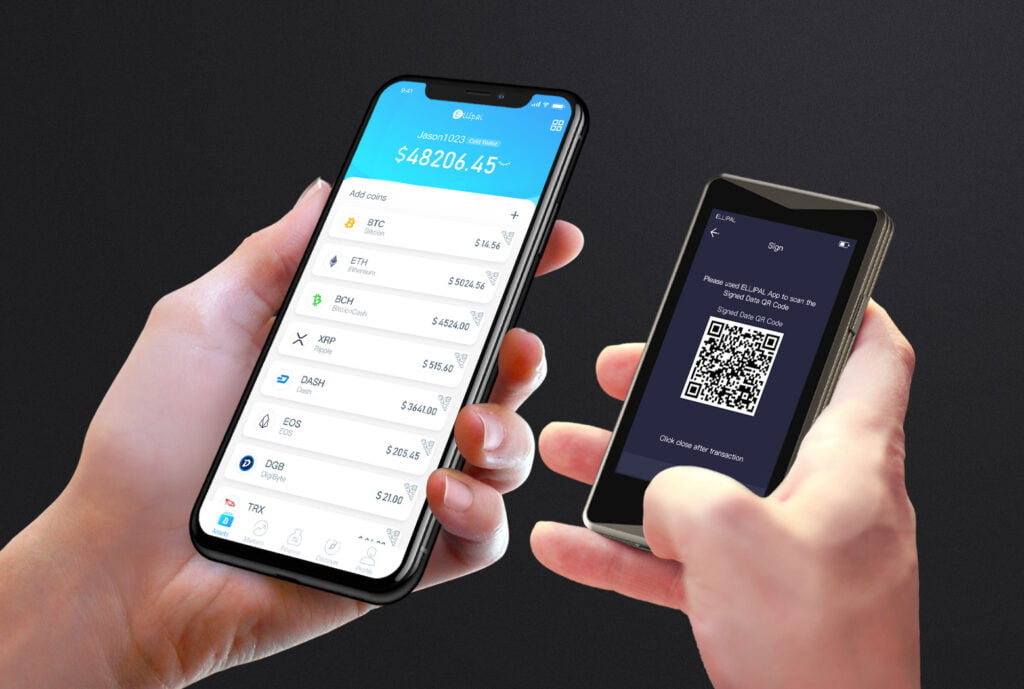
What Happens If I Lose My Device?
Don’t worry; your assets will remain safe. All hardware wallets devices are either PIN protected, or passphrase protected so that no one can access your holdings.
And to recover your wallet, you can recover it into any other cold or hot wallet that’s compatible with your lost one using the seed phrase generated during the wallet’s setup. That’s why we always recommend backing up your seed phrase somewhere safe; without your seed phrase, you can never recover your wallet.
Best Practices for Crypto Hardware Wallet Maintenance
Proper maintenance is essential for ensuring optimal performance and security of Crypto Hardware Wallets. Here are some best practices to follow:
- Regularly update firmware: Most Crypto Hardware Wallets offer firmware updates to address security vulnerabilities and add new features. It is crucial to keep the firmware up-to-date to ensure optimal performance and protection against potential attacks.
- Ensure software compatibility: Check for compatibility with wallet software and applications before upgrading firmware or making changes to the device. Incompatible software can cause malfunctions or loss of funds.
- Store recovery phrases securely: Backup and store the recovery phrases in a safe and secure location. Do not store them on a device connected to the internet or in plain sight where they can be easily accessed by unauthorized individuals.
- Perform test transactions: Before making large transactions, perform test transactions to ensure that the device is functioning correctly. Also, check for app and software updates before initiating any transaction.
- Use a protective case: Use a sturdy protective case to prevent damage to the device from accidental drops or impacts.
- Keep the hardware wallet away from electromagnetic fields: Do not expose the hardware wallet to electromagnetic fields as they can interfere with the device’s functionality.
- Be cautious of phishing attacks: Do not provide personal information or recovery phrases to anyone claiming to be customer support. Always verify the legitimacy of the request and the source before sharing any information.
By following these best practices, you can ensure that your Crypto Hardware Wallet remains secure and functional, protecting your valuable cryptocurrency assets.
Securing Your Crypto Assets: Hardware Wallets in the Future
The future of Crypto Hardware Wallets looks promising, with the growing adoption of cryptocurrencies and the need for robust security measures. As the technology evolves, hardware wallets will continue to play a significant role in providing a secure and user-friendly solution for managing crypto assets.
One area where hardware wallets are likely to see growth is in the field of Decentralized Finance (DeFi). DeFi platforms allow users to earn interest, trade, lend, and borrow cryptocurrencies without relying on centralized intermediaries. As more users flock to DeFi, the need for secure, trustworthy, and decentralized storage solutions increases. Crypto Hardware Wallets can fill this need by allowing users to store their private keys locally and securely.
Another potential advancement in Crypto Hardware Wallets is the integration of biometric authentication. Biometric authentication, such as fingerprint or facial recognition, adds an extra layer of security by requiring physical authentication in addition to the private key. This feature can further enhance the security and usability of hardware wallets.
Furthermore, advancements in hardware and software technologies will likely result in more sophisticated and advanced hardware wallets. These wallets could have larger storage capacities, faster processing speeds, and advanced features like multisignature and smart contract support.
The increasing popularity of cryptocurrencies also means that more hardware wallet manufacturers are entering the market. This increased competition is likely to drive innovation, reduce costs, and improve overall quality.
The Future of Crypto Hardware Wallets in Numbers
| Year | Global Crypto Hardware Wallet Market Size | Expected Compound Annual Growth Rate (CAGR) |
|---|---|---|
| 2021 | $494.4 million | 20.5% |
| 2022 | $606.9 million | 22.8% |
| 2023 | $736.9 million | 21.4% |
| 2024 | $890.6 million | 20.9% |
| 2025 | $1.07 billion | 20.2% |
The above table presents the projected global Crypto Hardware Wallet market size for the years 2021 to 2025, along with the expected compound annual growth rate (CAGR). As the numbers demonstrate, the Crypto Hardware Wallet market is growing at a rapid pace, indicating a bright future for these security solutions.
In conclusion, the future of Crypto Hardware Wallets looks promising, with the potential for advancements in technology, biometric authentication, and adoption in DeFi. As the market size grows and competition increases, users can expect to see more sophisticated and advanced hardware wallets in the market.
The Importance of Safe Storage and Maintenance
While Crypto Hardware Wallets offer unparalleled security, there are also risks and limitations to consider. Physical damages, loss, and user neglect can all result in the loss of cryptocurrency. Therefore, it is crucial to carefully store and maintain the hardware wallet to ensure optimal performance and protection of digital assets.
Following best practices, such as regularly updating firmware and backing up recovery phrases, can go a long way in ensuring the longevity and security of a Crypto Hardware Wallet.
The Future of Crypto Hardware Wallets
As technology continues to evolve, it is likely that Crypto Hardware Wallets will see further advancements, including integration with decentralized finance (DeFi) and emerging technologies.
In conclusion, Crypto Hardware Wallets offer a crucial layer of security for protecting cryptocurrency assets. With proper research, selection, and maintenance, users can rest assured that their digital assets are safe and secure.
Differences Between Cold and Hot Wallets.
In simple words, hot wallets connect to the internet. Hot wallets have the advantage of compatibility with many coins, also it’s more likely to get updates faster. However, your private keys are stored encrypted on servers or on your computer. Meaning, if a hacker managed to access them, they’ll have control over your private keys. That makes hot wallets a hazardous place to keep your holdings.
Unlike hot wallets, your cold wallet device itself is your own server, as your private key never leaves the device on any occasion. The fallback might be that it’s less upgradable and costs more than hot wallets, but it’s definitely worth it. Also, many hardware wallets offer great price points; make sure to check our review for the hardware wallets mentioned above, where we spoke in detail about features and prices.
Hardware Wallet Integration with The Software Wallets.
Lots of software wallets and also payment processors allow their users to keep their cryptocurrency safe by integrating with your hardware wallet; Here are some software wallets that integrate with hardware wallets:
- MetaMask
- Daedalus
- Yoroi
- Exodus
And there are many more wallets that have the same feature.
What to Look for In a Hardware Wallet?
There are many factors that decide which hardware wallet should you get.
Security Measures: Look for a hardware wallet with strict and hard security measures such as anti-theft, shock-proof, water-proof, and many others. Also, your hardware wallet should be Password Protected and you can look for a hardware wallet with a fingerprint if you want to.
Suitable Display: Try to find a hardware wallet with a suitable screen for you. Some users prefer large and touch screens, some others want small screens with buttons. There are many options that you should dive into and look for what’s best for you.
Air-gapped: There are some users that want hardware wallets with Bluetooth connection or USB in order to ease the process of transacting assets etc. It’s recommended to use air-gapped wallets with QR codes as it’s the best way to protect your assets even though Bluetooth or USB can be safe in some cases.
Reliable Company: The most important point is buying from a reliable company. Hardware wallets parts can’t be manipulated during shipment or so. A reliable company will always be more observant than other companies.
Customer Service: It’s always better when you buy from a company that has good and efficient customer service in case you faced any issue with your hardware wallet.
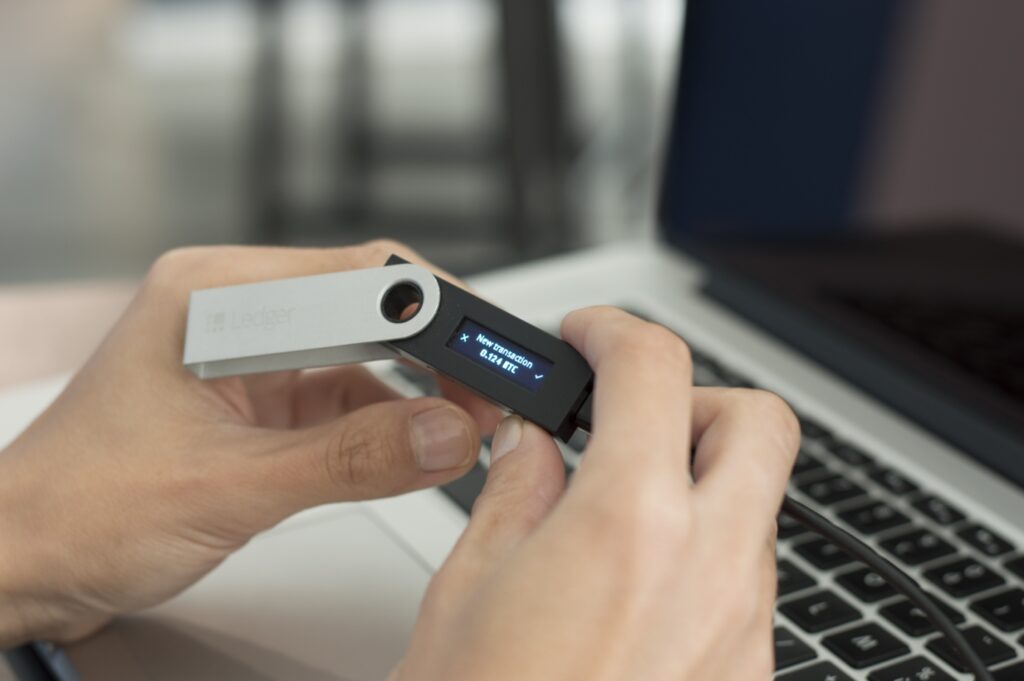
How to Keep Your Seed Phrase Safe.
After starting your first hardware wallet and generating your seed phrase, where do you save your private keys? Of course, your seed phrase is the most important thing in cryptocurrency… If your funds in a bank were compromised, the bank can be able to restore your funds. On the other hand, cryptocurrency is decentralized; which means if you ever lose your funds you can’t recover them. That’s why you should keep your seed phrase safe.
The first thing you might think about is writing down your seed phrase on paper and putting it on your disk. Or you might also think about taking a picture of your hardware wallet displaying your private keys and saving them on your phone. You should never do that.
We highly recommend using a steel case for your wallets. A steel case is a plate or capsule-shaped from stainless steel which works as a bag for your private keys. There are many forms of it and many shapes that work in different ways.
There are popular companies that have very respectable products in the market, which we have reviewed, here are some names:
- Keystone Tablet
- Cryptosteel Capsule
- Cryptosteel Solo by Ledger
- Billfodl
How to Cash out your Bitcoin on a Hardware Wallet:
You can’t convert bitcoin to cash directly whenever you want with hardware wallets. You can still sell your Bitcoin on the Blockchain exchange for the fiat currency you want. The exchange platform can handle the transaction on your side and find a buyer so that you convert your bitcoin or any crypto to fiat as quickly as possible.
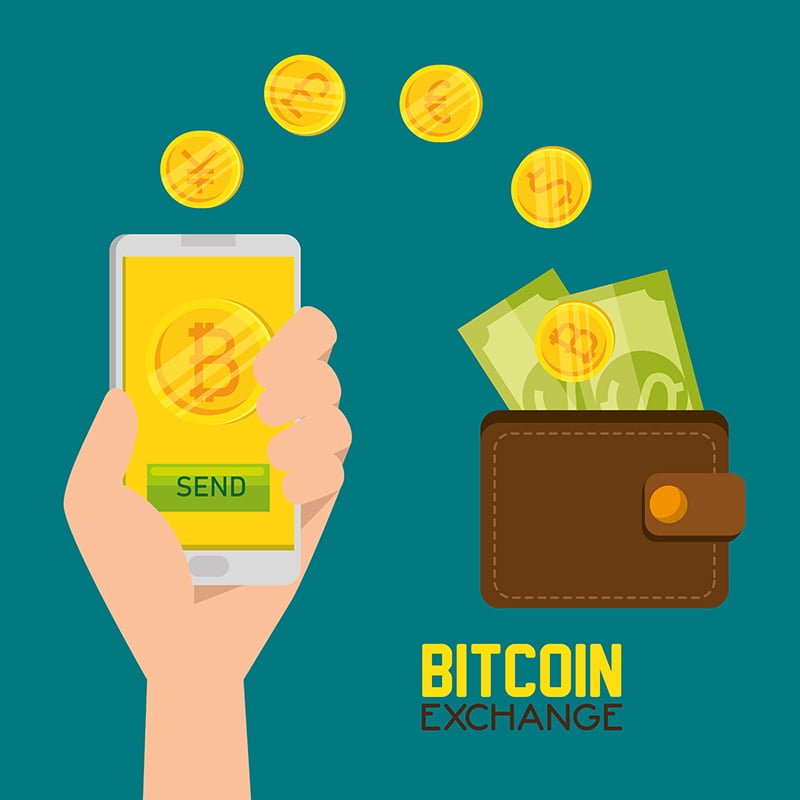
Pros and Cons of Hardware Wallets.
There’s nothing perfect, neither hardware wallets. Here are the pros and cons of having a hardware wallet.
Pros.
- Your private keys are kept safe, and they never leave your wallet.
- Your wallet is protected with a PIN code.
- It has mobility, and you can carry your wallet with you anywhere.
- Major security features like anti-tamper and water resistance.
- Limited connection to your phone or computer, making it immune to viruses.
Cons.
- You need to have your wallet with you to access your holdings.
- Works with fewer coins than hot wallets.
- It might be compromised during shipment.
- It needs integration to work.
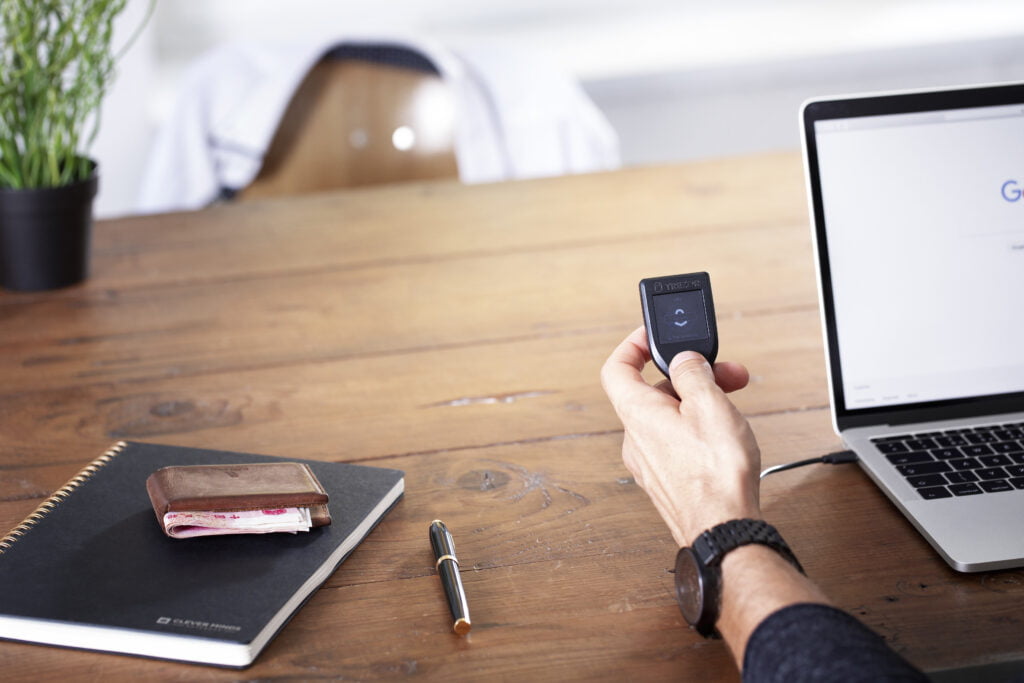
That was almost all you need to know about hardware wallets; now, check our review for each of the wallets mentioned above to have a full picture.
Conclusion
As cryptocurrency continues to surge in popularity, the need for secure storage options is paramount. Crypto Hardware Wallets offer a reliable and effective solution for protecting digital assets from theft, hacks, and other cyber threats.
Throughout this guide, we have explored the different aspects of Crypto Hardware Wallets, including their types, working mechanisms, and advantages. We have also reviewed some of the popular models, such as Ledger Stax and Safepal S1.
It is essential to choose the best Crypto Hardware Wallet that meets one’s specific needs and preferences. Factors to consider include security features, user-friendliness, and compatibility with different cryptocurrencies.
Hardware Wallets F.A.Q
FAQ
What are Crypto Hardware Wallets?
Crypto Hardware Wallets are physical devices designed to securely store and manage cryptocurrency private keys. They provide an extra layer of security by keeping the private keys offline and away from potential online threats.
What types of Crypto Hardware Wallets are available?
There are various types of Crypto Hardware Wallets available, including USB devices, smart cards, and even mobile devices with built-in security features. Each type offers different designs, features, and levels of security.
How do Crypto Hardware Wallets work?
Crypto Hardware Wallets work by generating and storing the user’s private keys offline within the device. When a transaction needs to be made, the device signs the transaction and then sends it to the network securely. This ensures that the private keys are never exposed to potential online threats.
How do I select the best Crypto Hardware Wallet?
When selecting a Crypto Hardware Wallet, it is important to consider factors such as security features, user-friendliness, compatibility with different cryptocurrencies, and customer support. You should also assess your own needs and preferences to find the best fit for you.
Can Crypto Hardware Wallets be used for storing Bitcoins?
Yes, Crypto Hardware Wallets can be used for securely storing and managing Bitcoins. There are specific hardware wallets designed specifically for Bitcoin storage, ensuring the highest level of security for your Bitcoin assets.
What is Ledger Stax and how does it compare to other hardware wallets?
Ledger Stax is a Crypto Hardware Wallet that offers advanced security features and compatibility with various cryptocurrencies. It is known for its robust security measures and user-friendly interface. Compared to other hardware wallets, Ledger Stax stands out with its sleek design and wide range of supported cryptocurrencies.
Can you provide information about SafePal S1?
SafePal S1 is a reliable Crypto Hardware Wallet known for its high-security standards and ease of use. It offers a secure chip and multiple layers of protection to safeguard your crypto assets. SafePal S1 supports a range of cryptocurrencies and provides a user-friendly experience for both beginners and experienced users.
What are some popular Crypto Hardware Wallets offered by Ledger?
Ledger offers a range of Crypto Hardware Wallets, including the Ledger Nano S, Ledger Nano X, and Ledger Blue. Each of these wallets provides top-notch security and supports various cryptocurrencies. Ledger Nano X, for example, offers Bluetooth connectivity and a larger storage capacity compared to the other models.
What are the advantages of using Crypto Hardware Wallets?
The advantages of using Crypto Hardware Wallets include enhanced security, offline storage of private keys, protection against hacking and malware attacks, and compatibility with multiple cryptocurrencies. They offer peace of mind and are considered one of the safest ways to store and manage crypto assets.
Are there any risks or limitations associated with Crypto Hardware Wallets?
While Crypto Hardware Wallets are highly secure, there are still some risks and limitations to consider. These include the possibility of physical damage or loss of the device, the responsibility of managing and securely storing recovery phrases or seed words, and the need to stay informed about potential firmware updates and security vulnerabilities.
How do I set up and use a Crypto Hardware Wallet?
Setting up and using a Crypto Hardware Wallet typically involves initializing the device, generating and securely storing recovery phrases or seed words, and installing the necessary wallet software on your computer or mobile device. Each wallet comes with specific instructions that should be followed carefully.
What are some tips for safely storing a Crypto Hardware Wallet?
To safely store a Crypto Hardware Wallet, consider physical security measures such as using a safe or security deposit box. It is crucial to regularly back up your recovery phrases or seed words and store them in a secure location. Additionally, avoid sharing your private keys with anyone and be cautious of potential phishing attempts.
What are the best practices for maintaining a Crypto Hardware Wallet?
To maintain a Crypto Hardware Wallet, it is important to regularly update the wallet’s firmware to ensure the latest security features and bug fixes. It is also recommended to check for compatibility with new wallet software versions and exercise general care, such as keeping the device clean and avoiding exposure to extreme temperatures or physical damage.
What is the future outlook for Crypto Hardware Wallets?
Crypto Hardware Wallets are expected to continue playing a crucial role in securing cryptocurrency assets. As the crypto industry evolves, hardware wallets may integrate with decentralized finance (DeFi) platforms and leverage emerging technologies to provide even more advanced security features and seamless user experiences.




